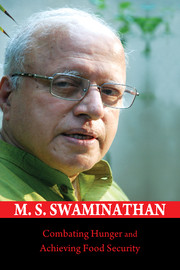Book contents
- Frontmatter
- Contents
- Foreword
- Preface
- Acknowledgements
- Abbreviations
- 1 Genesis and Growth of the Yield Revolution in Wheat
- 2 Our Agricultural Heritage
- 3 Shaping Our Agricultural Destiny
- 4 Thrust on Farm Revival
- 5 Nutri-farm Movement
- 6 Nutrition-sensitive Agriculture
- 7 Food Losses and Food Waste
- 8 Rice in Zero Hunger Challenge
- 9 Monsoon Management
- 10 Importance of Ecological Conservation
- 11 Caring for Ecology and Heritage
- 12 Conserving Biodiversity
- 13 Overcoming Hidden Hunger through Aquaculture
- 14 Biofuels – The Way to Go
- 15 Food Security
- 16 Vigilance for Sustainable Food Security
- 17 Food Security and Social Protection
- 18 Food Security and its Role
- 19 Sustaining the Livestock Revolution
- 20 Challenges in the Year of Science
- 21 Agriculture and Humanism
- 22 Fostering the Science of Science Communication
- 23 Olympic Move for Saving Children
- 24 Youth: The Agents of Change
- 25 Role of Women in Agricultural Production
- 26 Know-how to Do-how
- 27 From Bengal Famine to Right to Food
- 28 Financial Institutions and Fighting Food Inflation
- 29 Public Good Research in Agriculture
- 30 The Future of Indian Agriculture
- Bibliography
4 - Thrust on Farm Revival
Published online by Cambridge University Press: 18 December 2015
- Frontmatter
- Contents
- Foreword
- Preface
- Acknowledgements
- Abbreviations
- 1 Genesis and Growth of the Yield Revolution in Wheat
- 2 Our Agricultural Heritage
- 3 Shaping Our Agricultural Destiny
- 4 Thrust on Farm Revival
- 5 Nutri-farm Movement
- 6 Nutrition-sensitive Agriculture
- 7 Food Losses and Food Waste
- 8 Rice in Zero Hunger Challenge
- 9 Monsoon Management
- 10 Importance of Ecological Conservation
- 11 Caring for Ecology and Heritage
- 12 Conserving Biodiversity
- 13 Overcoming Hidden Hunger through Aquaculture
- 14 Biofuels – The Way to Go
- 15 Food Security
- 16 Vigilance for Sustainable Food Security
- 17 Food Security and Social Protection
- 18 Food Security and its Role
- 19 Sustaining the Livestock Revolution
- 20 Challenges in the Year of Science
- 21 Agriculture and Humanism
- 22 Fostering the Science of Science Communication
- 23 Olympic Move for Saving Children
- 24 Youth: The Agents of Change
- 25 Role of Women in Agricultural Production
- 26 Know-how to Do-how
- 27 From Bengal Famine to Right to Food
- 28 Financial Institutions and Fighting Food Inflation
- 29 Public Good Research in Agriculture
- 30 The Future of Indian Agriculture
- Bibliography
Summary
India is going through a serious agrarian crisis. Grains are rotting while children are starving. Food inflation has once again emphasized the need for building a food and nutrition security system based largely on home-grown food, particularly in the field of pulses and oilseeds. The next National Family Health Survey may reveal an increase in malnutrition among children and women due to the steep escalation in the price of protein-rich foods like pulses. Agricultural growth is slow and the contribution of agriculture to GDP has come down. Rural poverty and agrarian distress are thus increasing.
There are at least five major groups of factors leading to rural and agricultural distress. First, the ecological foundations essential for sustainable advances in the productivity and profitability of major farming systems like soil, water, biodiversity and climate are weakening. The water table is going down and water quality is also poor in many places. The funds allotted for conservation farming and climate-resilient agriculture in the heartland of the Green Revolution – Punjab, Haryana and western Uttar Pradesh – have been grossly inadequate but a beginning can be made in fostering ecologically sound farm practices.
The second area of concern is the prevailing adverse cost-risk-return structure of farming. It is obvious that if farm ecology and economics go wrong, nothing else will go right in agriculture. The adverse economics is due to the escalation in the cost of inputs on one hand, and a steady decline in factor productivity on the other. Soil organic carbon content is also low and hence building soil carbon banks through fertilizer trees is an urgent necessity, if India is to derive full benefit from nutrient-based subsidies.
The third area of concern relates to technology. There is a growing mismatch between production and post-harvest technologies. Hence, there is not only inadequate value addition to the primary produce, but also huge post-harvest losses. Storage facilities are poor, and government agencies will have to find methods of storing the food-grains being purchased. We need a bold initiative like the Golden Quadrilateral of Atal Behari Vajpayee in case of roads, for organizing a national grid of modern grain storages.
The fourth area relates to small farm management. A suitable farm management revolution is essential for bridging the gap between potential and actual yields in most cropping systems.
- Type
- Chapter
- Information
- Combating Hunger and Achieving Food Security , pp. 21 - 24Publisher: Cambridge University PressPrint publication year: 2016



